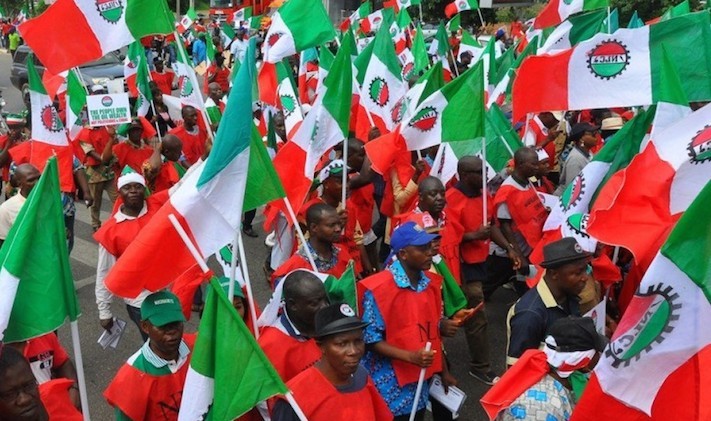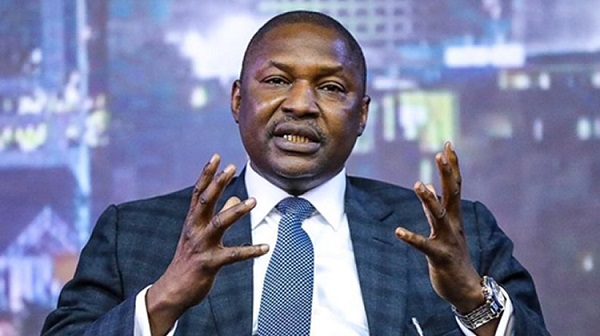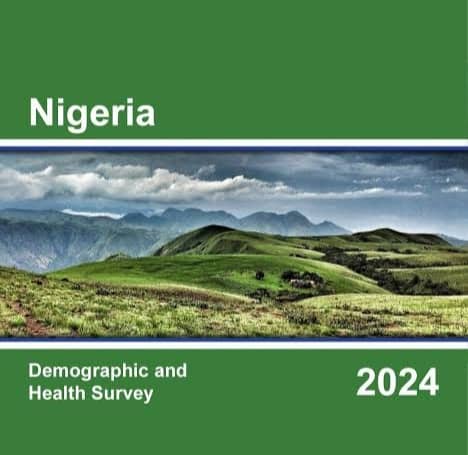News
Build up to the Dangote Refinery workers’ sack

The present sack gale that rocked the Dangote Refinery is the anti climax arising from the plan by the Dangote refinery to import 4,000 Compressed Natural Gas-powered trucks for the direct distribution of fuel to retailers. Though the scheme scheduled to commence on August 15 was delayed by logistics challenges in China, but eventually commenced a month later on September 15.
NUPENG, in a statement signed by its President, Williams Akporeha and the General Secretary, Afolabi Olawale, on September 6, 2025, accused the management of the Dangote refinery of alleged anti-labour practices inimical to the survival and means of livelihoods of its members under its Petroleum and Tanker Drivers Branch.
The union lamented that the founder of the refinery, Aliko Dangote, had said that new drivers would be recruited for the imported trucks and none of them would be allowed to join any union. NUPENG described the position taken by the management of Dangote refinery as an affront to the right of association, guaranteed under the 1999 Constitution, and a breach of relevant international labour laws to which Nigeria is a signatory.
It recalled several meetings it initiated, jointly with the leadership of the Nigerian Association of Road Transport Owners, to prevail on Aliko Dangote to rescind his stance on not allowing its drivers to join trade unions. However, the Union expressed regret that its appeals were allegedly ignored.
NUPENG said it would not stand idly by and watch while the livelihoods of thousands of workers, including tanker drivers, are destroyed. “NUPENG stood in solidarity with Dangote Refinery during its construction and commissioning. We did so in good faith, in expectation that it would create jobs, strengthen local capacity, and benefit the Nigerian people, under a conducive atmosphere for unions to thrive.
September 6, 2025
The Direct Trucking Company Drivers Association (DTCDA), said there was no basis for the purported strike action being championed by the Nigeria Union of Petroleum and Natural Gas Workers (NUPENG) slated to commence on September 8.
September 7, 2025
NLC, PETROAN beg for President Tinubu’s intervention to avert strike
September 8, 2025:
NUPENG shut down petrol loading at Dangote Refinery as strike began
DAPPMAN sues for dialogue
On September 9, 2025
Dangote and NUPENG signed a Memorandum of Understanding strengthening refinery workers’ constitutional right to unionise.
September 10, 2025
NUPENG accused the firm of acting in bad faith giving instructions to truck drivers to remove union stickers and report for loading, a move the union described as intimidation. Dangote Groups denounced the claims as “cheap blackmail.”
September 11, 2025
NUPENG threatened to resume strike, blocking loading in Dangote Refinery. The union accused Dangote Refinery of negating the resolutions reached at the earlier peace meeting brokered by the DSS.
Dangote Petroleum Refinery dismissed allegations made by the NUPENG, insisting that claims of anti-labour practices, monopolistic behaviour, and planned fuel price hikes are “entirely unfounded.”
According to Dangote Refinery, central to NUPENG’s allegations is the roll-out of over 4,000 CNG-powered bulk trucks, which the union claims could displace existing jobs. Dangote Group firmly refuted this, describing the initiative as a cornerstone of Nigeria’s energy transition strategy.
“The deployment of CNG-powered trucks is a strategic initiative designed to support national energy transition goals, not to displace existing jobs,” the company stated. Each truck will be operated by a six-person team, with drivers receiving salaries significantly above the national minimum wage, plus medical cover, pensions, housing allowances, and long-term access to housing loans. The company aims to have 10,000 such trucks in operation by year-end, potentially creating over 60,000 direct jobs.
September 25, 2025
Dangote Refinery sacks 800 workers
Prior to yesterday’s sacking of 800 workers by the Dangote Refinery, the Petroleum and Natural Gas Senior Staff Association of Nigeria (PENGASSAN), in solidarity with the Nigeria Union of Petroleum and Natural Gas Workers (NUPENG), had earlier threatened to shut down Dangote Refinery over management’s refusal to allow tanker drivers and other employees to unionize.
PENGASSAN voiced its frustration with what it described as the refinery’s persistent resistance to unionization efforts, stressing that “all diplomatic efforts had failed to resolve the issue.”
The union further warned that if the standoff continued, it would have no option but to “join NUPENG in shutting down refinery operations to protect workers’ rights and interests.”
The Dangote Refinery, an oil refinery owned by Dangote Group, was inaugurated on 22 May 2023 in Lekki, Nigeria. When fully operational, it is expected to have the capacity to process about 650,000 barrels of crude oil per day, making it the largest single-train refinery in the world. The investment is over S$20 billion
News
Washington attack: US orders review of all Green Cards from 19 countries

The United States government has announced a sweeping review of all Green Cards issued to citizens of 19 countries, following Wednesday’s attack on National Guard troops in Washington, D.C.
The Trump administration disclosed the move on Thursday after authorities identified the detained suspect as a 29-year-old Afghan national who had previously worked with American forces in Afghanistan.
According to AfghanEvac, an organisation involved in the resettlement of Afghans after the 2021 Taliban takeover, the suspect was granted asylum in April 2025, not permanent residency.
In a statement on X, the Director of the US Citizenship and Immigration Services (USCIS), Joseph Edlow, said, “I have directed a full-scale, rigorous re-examination of every Green Card for every alien from every country of concern.”
The order had earlier banned nearly all nationals from 12 of those countries, including Afghanistan, from entering the United States.
Here is a full list of countries under the travel ban:
Countries with Full Travel Ban (12)
1. Afghanistan
2. Myanmar
3. Chad
4. Congo-Brazzaville
5. Equatorial Guinea
6. Eritrea
7. Haiti
8. Iran
9. Libya
10. Somalia
11. Sudan
12. Yemen
Countries with Partial Ban (7)
1. Burundi
2. Cuba
3. Laos
4. Sierra Leone
5. Togo
6. Turkmenistan
7. Venezuela
News
EFCC summons ex-AGF Malami

The Economic and Financial Crimes Commission (EFCC) has invited former Attorney-General of the Federation and Minister of Justice, Abubakar Malami, for questioning.
Malami served as Attorney-General and Minister of Justice from 2015 to 2023 under former President Muhammadu Buhari.
Malami announced the development on his Facebook page on Friday, confirming that he had received a formal invitation from the anti-graft agency.
“I would like to inform my family and friends that I have been summoned by the EFCC to provide clarification on certain matters, and as a law-abiding and patriotic citizen, I am determined to honour this invitation without any hesitation,” he wrote.
The former minister reiterated his commitment to the principles of honesty, integrity, and accountability, which he said guided his years in public service.
“I believe in the importance of honesty, integrity, and accountability in governance; these are principles that I have long supported and upheld over the years of my public service,” he added.
Malami also stated that he would keep Nigerians informed of any developments that may arise from the invitation.
News
NDHS: Nigerian regions show huge disparity in spousal earnings

• South South most equal
By Grace Edet
New data from the 2024 Nigeria Demographic and Health Survey (NDHS) has revealed major regional disparities in spousal earnings, showing that most Nigerian wives aged 15–49 earn less than their husbands, despite growing pockets of income equality across the country.
According to figures shared by Statisense on Tuesday, the trend is most pronounced in the North-West, where 941 in 1,000 wives earn less than their husbands, while only 29 in 1,000 earn more. The region also recorded the lowest rate of non-earning husbands, with just 7 in 1,000 women reporting partners with no income.
In contrast, the South South posted the strongest levels of income parity. The region recorded 113 in 1,000 wives earning the same as their husbands, the highest nationwide. It also had the largest share of women earning more than their spouses at 61 in 1,000.
The North East also showed notable shifts. While 30 in 1,000 wives out-earn their husbands, one of the highest shares in the country, the region still reported that 888 in 1,000 women earn less, reflecting wide inequality despite emerging improvements.
The North Central displayed more balanced figures, with 46 in 1,000 women earning more, and 65 in 1,000 earning equally, though 848 in 1,000 wives still fall below their husbands’ income levels.
In the South East, income gaps remain significant but show signs of narrowing. The data shows 57 in 1,000 wives earn more, 82 in 1,000 earn equally, while 775 in 1,000 still earn less than their husbands.
For the South West, 45 in 1,000 wives earn more, and 75 in 1,000 earn the same, but 824 in 1,000 wives still earn below their husbands’ earnings. Only 11 in 1,000 husbands reported having no income.
The NDHS 2024 findings highlight a consistent national pattern: while traditional income structures remain strong, especially in northern regions, the southern zones, particularly the South South, are showing faster shifts toward income equality within households.
Experts say the trend reflects broader economic realities, including rising female participation in formal work, regional differences in literacy levels, and contrasting socio-cultural expectations about household roles.
The full survey continues to shape policy discussions on women’s economic empowerment, labour participation, and regional development priorities.
-

 Art & Life9 years ago
Art & Life9 years agoThese ’90s fashion trends are making a comeback in 2017
-

 Entertainment8 years ago
Entertainment8 years agoThe final 6 ‘Game of Thrones’ episodes might feel like a full season
-

 Art & Life9 years ago
Art & Life9 years agoAccording to Dior Couture, this taboo fashion accessory is back
-

 Business9 years ago
Business9 years agoThe 9 worst mistakes you can ever make at work
-

 Entertainment9 years ago
Entertainment9 years agoThe old and New Edition cast comes together to perform
-

 Sports9 years ago
Sports9 years agoPhillies’ Aaron Altherr makes mind-boggling barehanded play
-

 Entertainment8 years ago
Entertainment8 years agoMod turns ‘Counter-Strike’ into a ‘Tekken’ clone with fighting chickens
-

 Entertainment9 years ago
Entertainment9 years agoDisney’s live-action Aladdin finally finds its stars





